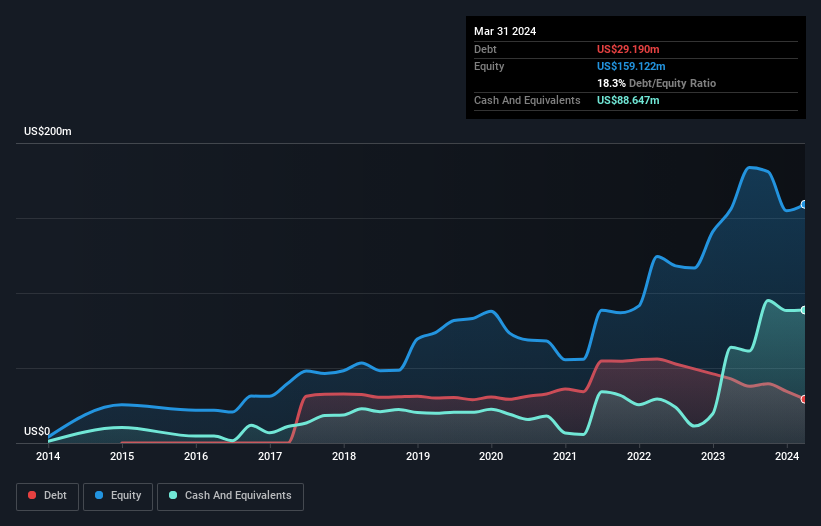Legendary fund manager Li Lu (who Charlie Munger backed) once said, 'The biggest investment risk is not the volatility of prices, but whether you will suffer a permanent loss of capital.' When we think about how risky a company is, we always like to look at its use of debt, since debt overload can lead to ruin. We can see that Maha Energy AB (publ) (STO:MAHA A) does use debt in its business. But is this debt a concern to shareholders?
When Is Debt Dangerous?
Debt and other liabilities become risky for a business when it cannot easily fulfill those obligations, either with free cash flow or by raising capital at an attractive price. If things get really bad, the lenders can take control of the business. However, a more usual (but still expensive) situation is where a company must dilute shareholders at a cheap share price simply to get debt under control. Of course, the upside of debt is that it often represents cheap capital, especially when it replaces dilution in a company with the ability to reinvest at high rates of return. When we examine debt levels, we first consider both cash and debt levels, together.
View our latest analysis for Maha Energy
How Much Debt Does Maha Energy Carry?
The image below, which you can click on for greater detail, shows that Maha Energy had debt of US$29.2m at the end of March 2024, a reduction from US$42.7m over a year. However, its balance sheet shows it holds US$88.6m in cash, so it actually has US$59.5m net cash.

How Strong Is Maha Energy's Balance Sheet?
We can see from the most recent balance sheet that Maha Energy had liabilities of US$40.0m falling due within a year, and liabilities of US$976.0k due beyond that. Offsetting these obligations, it had cash of US$88.6m as well as receivables valued at US$1.18m due within 12 months. So it can boast US$48.8m more liquid assets than total liabilities.
This luscious liquidity implies that Maha Energy's balance sheet is sturdy like a giant sequoia tree. With this in mind one could posit that its balance sheet means the company is able to handle some adversity. Simply put, the fact that Maha Energy has more cash than debt is arguably a good indication that it can manage its debt safely. The balance sheet is clearly the area to focus on when you are analysing debt. But it is future earnings, more than anything, that will determine Maha Energy's ability to maintain a healthy balance sheet going forward. So if you want to see what the professionals think, you might find this free report on analyst profit forecasts to be interesting.
In the last year Maha Energy had a loss before interest and tax, and actually shrunk its revenue by 41%, to US$4.5m. That makes us nervous, to say the least.
So How Risky Is Maha Energy?
While Maha Energy lost money on an earnings before interest and tax (EBIT) level, it actually booked a paper profit of US$3.6m. So when you consider it has net cash, along with the statutory profit, the stock probably isn't as risky as it might seem, at least in the short term. We'll feel more comfortable with the stock once EBIT is positive, given the lacklustre revenue growth. The balance sheet is clearly the area to focus on when you are analysing debt. But ultimately, every company can contain risks that exist outside of the balance sheet. These risks can be hard to spot. Every company has them, and we've spotted 2 warning signs for Maha Energy (of which 1 is concerning!) you should know about.
If, after all that, you're more interested in a fast growing company with a rock-solid balance sheet, then check out our list of net cash growth stocks without delay.
New: Manage All Your Stock Portfolios in One Place
We've created the ultimate portfolio companion for stock investors, and it's free.
• Connect an unlimited number of Portfolios and see your total in one currency
• Be alerted to new Warning Signs or Risks via email or mobile
• Track the Fair Value of your stocks
Have feedback on this article? Concerned about the content? Get in touch with us directly. Alternatively, email editorial-team (at) simplywallst.com.
This article by Simply Wall St is general in nature. We provide commentary based on historical data and analyst forecasts only using an unbiased methodology and our articles are not intended to be financial advice. It does not constitute a recommendation to buy or sell any stock, and does not take account of your objectives, or your financial situation. We aim to bring you long-term focused analysis driven by fundamental data. Note that our analysis may not factor in the latest price-sensitive company announcements or qualitative material. Simply Wall St has no position in any stocks mentioned.
Have feedback on this article? Concerned about the content? Get in touch with us directly. Alternatively, email editorial-team@simplywallst.com
About OM:MAHA A
Maha Capital
Engages in the exploration, development, and production of oil, natural gas, and minerals sectors in Brazil, the United States, and Oman.
Flawless balance sheet with very low risk.
Market Insights
Community Narratives




